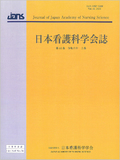Japanese
English
- 販売していません
- Abstract 文献概要
- 参考文献 Reference
要旨
目的:看護職の超過勤務に関わる部署・病棟要因を明らかにする.
方法:6施設62病棟(急性期一般入院基本料1と特定機能7対1を算定している病棟)に在籍する1,215人のスタッフ看護職の無記名自記式質問紙調査から得られたデータを,令和3年度病床機能報告公表データと結合させた.個人,病棟,病院の3レベルのマルチレベル分析にて超過勤務時間に影響する要因を検証した.
結果:本研究の対象者における超過勤務時間は日勤1回当たり約2時間であった.病棟の平均看護職当たり患者数が1人増加すると病棟の平均超過勤務時間が10分増加していた.一方で,病棟の重症患者割合,平均在院日数,及び1床当たり救急入院数は有意な影響を及ぼしていなかった.
結論:各病棟において看護職当たり患者数が減少すると超過勤務時間が減少する可能性が示唆された.
Objective: To clarify the factors of hospital wards that are related to overtime work by nurses.
Method: Data obtained from an anonymous self-administered questionnaire survey of 1,215 staff nurses enrolled in 62 wards at six facilities(General ward hospitalization basic fee 1 and special function 7 to 1) were combined with the data from the 2021 Report on the Bed Functions. We verified the factors that affect overtime hours by using a three-level multi-level analysis.
Results: Overtime hours for the subjects in this study were approximately 2 hours per day shift. When the average number of patients per nursing staff in the ward increased by 1, the average overtime hours in the ward increased by 10.5 minutes. Conversely, the percentage of critically ill patients in the ward, the average length of stay, and the number of emergency hospitalizations per bed displayed no significant effect.
Conclusion: The findings suggest that overtime hours in each ward could be reduced by increasing nurse staffing levels.
Copyright © 2024, Japan Academy of Nursing Science. All rights reserved.


